
![]()
*****************************************************
Following is the speech (English translation) made by the Financial Secretary, Mr Henry Tang, on Hong Kong's economy and management of public finances at the Legislative Council meeting today (October 22):
Madam President, Honourable Members,
Thank you for allowing me to make a statement today. Two and a half months ago, I was both honoured and privileged to have been appointed as the Financial Secretary of the Hong Kong Special Administrative Region. I said at that time, and I reiterate now, that my principal and immediate task is to revitalise our economy. I also said that an important part of that process would be to consult the community widely to ascertain your aspirations and priorities, and to devise effective measures to tackle the economic challenges that we face.
2. Indeed, since taking up this new job I have been holding informal discussions with various sectors, including Honourable Members. And now, when we are about to embark upon the more formal consultations that will help me craft my first Budget, I feel it important to explain the principles that will guide my decision-making. I would also like to take this opportunity to provide Honourable Members with an overview of the way the economy has been performing, and to pose some questions about how we might go about tackling our budget deficit in the short to medium term.
Guiding principles
3. In embarking upon the budgetary process, I believe it is essential that our discussions and decisions be carried out in an open and transparent manner. It is important that members of the community are fully aware of how and why certain decisions are made. I hope that this approach will engender a spirit of informed, rational and constructive debate, during which a consensus can be forged on the best way forward. It is my sincere wish that we all work together to improve the state of public finances and the economy, and to promote a prosperous, harmonious and caring society.
4. The free market has been the bedrock of Hong Kong's success. Our entrepreneurs, small business owners and our productive workforce have been the major drivers of higher living standards and growing per capita GDP. I very much want that to remain the case. The Government's role in the economy should be kept to a minimum; and its size should also be kept as small as possible. "Big market, small government" is certainly the right way to go.
5. Hong Kong's success is also buttressed by a sound institutional framework ᄀV the rule of law upheld by an independent judiciary, a level playing field for business, the free flow of information, and a clean, efficient Administration. This provides business with the confidence to invest time and money in Hong Kong. We must continue to maintain a high degree of transparency in the process of policy formulation. We must also provide business with policy consistency and predictability so that informed, long-term business decisions can be made without fear of arbitrary change next week, next month, or next year.
6. These principles have served us well in the past, and I certainly want to uphold this winning formula. I believe the role of the Government should be to facilitate the market and its development; to provide a stable, predictable and business-friendly environment for investment; as well as to provide the institutional infrastructure, the essential services and facilities that the market cannot provide.
7. In terms of market facilitation, our Closer Economic Partnership Arrangement (CEPA) with the Mainland is a good example of how the Government can help the market develop, in this case by negotiating early and preferential access to the Mainland market for Hong Kong manufacturers and service providers. The Government's efforts to allow individual tourists to visit from the Mainland is another example, and this has had a noticeable and positive effect on visitor arrivals. We have also been in discussion with the Mainland on developing Renminbi (RMB) banking services in Hong Kong. In this regard, we would, as a first step, focus on securing the successful trial run of RMB deposits, remittances, money exchange and credit card business for individuals in Hong Kong. I hope this will materialise very soon.
8. Of course, the Government also has solemn responsibilities towards its citizens. These include: protecting our basic rights and freedoms; maintaining law and order; educating our children; training, retraining and upgrading the skills of our workers to improve employment opportunities; providing for the needy and elderly; providing affordable and sustainable medical and health care; offering shelter to those who cannot afford their own; promoting environmentally sustainable development; and ensuring public services are value for money. Obviously, meeting all of these responsibilities has a major bearing on the budgetary process and my work as Financial Secretary. And that is why the Administration will continue to listen carefully to the views of the public.
Building on Hong Kong's unique strengths
9. The principles and policies I have mentioned earlier are our greatest assets. They are what set us apart in Asia. I have often stressed that we should compete on our strengths. We should capitalise on the quality of our market and services, and position ourselves as a centre of excellence, not just for Asia but for the whole world. We do not need to reinvent the wheel. But we need to be innovative and determined to build on and continue to improve on what we are good at, and to make sure that we do it extremely well.
10. Financial services, transport and logistics, tourism, producer and professional services, and innovative, high value-added and technology-based manufacturing - these are the areas in which we enjoy a solid advantage; sectors that are currently driving our economic development. We should continue to compete on our market quality, and strive to improve it even further.
11. As regards financial services, we are committed to enhancing corporate governance and the regulatory environment. This will improve the quality of our market and, in turn, attract liquidity.
12. We will continue to uphold our robust protection of intellectual property rights, providing an environment in which creative, innovative and high value-added industries can flourish.
13. We will continue to invest heavily in education and training so that our citizens can acquire the skills necessary to find employment and to meet the challenges of a knowledge-based economy. At the same time, we will also maintain a liberal immigration regime so that we can attract the best and the brightest from around the world.
14. I place revitalising the economy as my top priority because I believe that as the business environment continues to improve, local and overseas investors will have greater confidence in undertaking new or expanded projects in Hong Kong and this will in turn create more and better job opportunities for workers in all sectors. Needless to say, the Administration will continue to actively consider other measures that might help to improve the employment situation.
Economic situation
15. I would now like to talk about our current economic situation and the outlook for 2003 and the medium term.
16. There has been a visible upswing in economic activity and sentiment over the past month or two, giving me room for cautious optimism that the economy has bottomed out. But we must not be complacent. To reinforce this, we must allow market forces to operate freely, and encourage the public and private sectors to work hand in hand towards a steady and sustainable recovery.
17. Despite the Severe Acute Respiratory Syndrome (SARS) crisis, our external trade continued to grow strongly, and helped offset the sharp downturn experienced in other sectors such as tourism, catering and retail. In the more recent period, growth in real terms in exports of goods remained in double digits, while exports of services have also staged a sharp upturn.
18. In the past two months, we have seen a continuous inflow of funds into Hong Kong. This has led to the market exchange rate of the Hong Kong Dollar against the US Dollar moving more on to the strong side of the link. The stock market is at a 26-month high, and turnover has doubled from an average of $6.1 billion a day in the first quarter, to $12 billion a day in the third quarter. Property transactions are picking up - agreements for sale and purchase have risen from 17,500 in the second quarter to almost 22,500 in the third quarter. The number of homeowners in negative equity is expected to decrease to less than 100,000 with improved market sentiment. The number of bankruptcy petitions in September dropped by about one third compared with that a year ago.
19. Visitor arrivals have rebounded strongly after the SARS outbreak and, as you know, there has been a very strong increase in the number of Mainland visitors following the start of the "individual visit" scheme. Local consumption sentiments have also improved. Retail sales have risen for the first time in seven months in terms of both value and volume. The unemployment rate is easing off, and has further reduced to 8.3%. I very much hope that the recovery we are seeing will further improve the job situation. There are signs lately that deflation is easing back, after deteriorating significantly due to the SARS outbreak. And again, further improvement on this front will hinge on the strength and speed of the recovery.
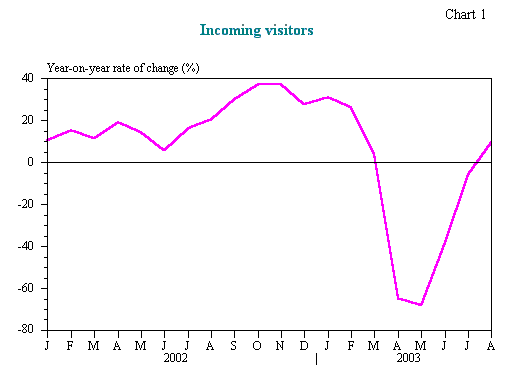
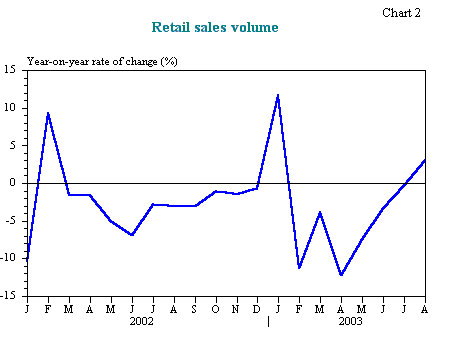
20. The fundamental strength and resilience of our economy going forward is reflected in the recent upgrade by Moody's Investors Services of Hong Kong's sovereign rating for foreign currency by two notches from A3 to A1.
21. With the current pace of the upturn, I reckon that the economy could attain a somewhat better performance for this year than was suggested in our earlier forecast of a 2% real GDP growth. Our latest forecast is for the economy to grow by around 3% for 2003.
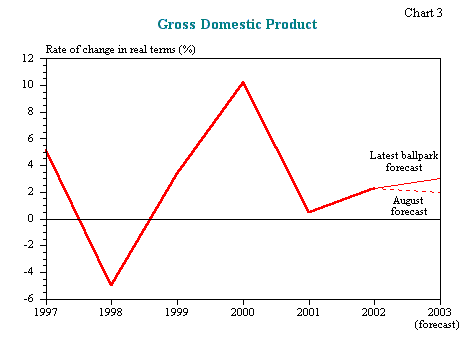
22. The outlook for the medium term is also positive. This will be underpinned by further reform and opening up in the Mainland market, which will allow Hong Kong to play to its strengths as the pre-eminent services platform for the Mainland economy. The signing of CEPA provides the opportunity of a lifetime for Hong Kong manufacturers and service providers to gain preferential access to the huge Mainland market ahead of and beyond China's WTO commitments. CEPA should expand our businesses' horizon far beyond the physical boundary. It will provide the launching pad for our entrepreneurs to benefit from the Mainland's rapid economic development, particularly the burgeoning Pearl River Delta. CEPA will further add to Hong Kong's appeal as the premier international finance and business centre in the Asia-Pacific Region.
23. As Hong Kong's economic relations develop with the Mainland and other Asian economies, and with growing signs of renewed recovery in the global economy, we now forecast the trend growth rate of GDP to be half a percentage point higher at 3.5% for the medium term.
Managing public finances
24. I would now like to talk about public finances.
25. Here, I would like first of all to reiterate my commitment to upholding the important principles set out in the Basic Law: to manage public finances prudently, to live within our means and to strive to achieve a fiscal balance. I would also like to reaffirm my commitment to adhere to a low and simple tax regime and to maintain the stability and integrity of the monetary system.
26. As Honourable Members will know, we are facing a large budget deficit this year. Our original forecast was for a deficit of $68 billion. But that was before SARS and the additional $12.6 billion committed for the economic relief and support package released between March and June. I therefore envisage the deficit will go up to $78 billion, plus or minus $5 billion, for 2003-04. These figures will be fine-tuned in my Budget Speech next March. This takes into consideration not only the negative impact of SARS on our fiscal position, but also the more positive signs emerging over the past couple of months.
27. I have very carefully considered the Government's previous commitment to balance the Budget by 2006-07. I said on the day of my appointment that I thought this deadline was no longer realistic given the current circumstances. The discussions I have had with various groups and sectors over the past two and a half months have led me to believe that the community also favours giving the economy some more room to breathe in the next year or two.
28. Accordingly, I have set a new target to achieve fiscal balance by 2008-09. The Administration is determined to control government operating expenditure and to bring it down to $200 billion by 2008-09. On the recurrent revenue side, our aim is to attain $200 billion by 2008-09. In this way, I expect to reach a balanced Operating Account by 2008-09. I also aim to restore balance in the Consolidated Account by the same year. We will review this target and the means to achieve it each year having regard to the prevailing economic situation.
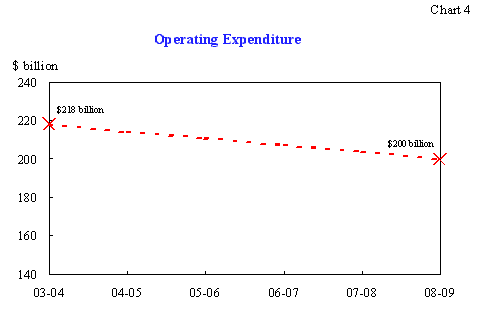
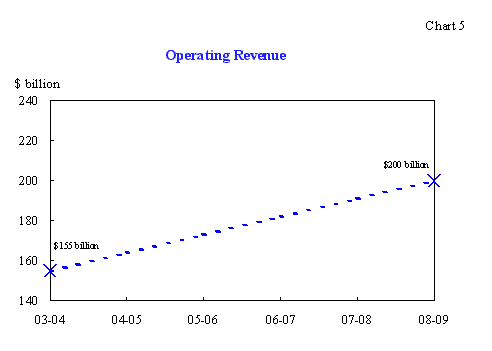
29. In line with the principle of "big market, small government", we need to keep public expenditure in the economy at an appropriate level. In the 1980s and early 1990s, this averaged about 16%. It now stands at 23%. We have pledged to bring public expenditure to 20% of GDP or below, and I remain committed to this.
30. As Honourable Members are aware, we have been drawing down our fiscal reserves to fund the Budget deficit. Our experience in weathering the various economic setbacks over the past few years has shown us the wisdom and importance of saving for a rainy day. I also believe it is reasonable and responsible for this Administration to leave a prudent level of fiscal reserves for the next Government. Over the next few months, I will gauge the opinions of Honourable Members and other members of the community on what should be a reasonable level of fiscal reserves.
Improving our fiscal position
31. Improving our economy is the first step towards addressing our fiscal situation. The Chief Executive, in his Policy Address in January this year, set out a three-pronged approach to solving the deficit problem: boost economic growth, cut public expenditure, and raise revenue. The recent upswing in economic activities should help boost government revenue and ease our fiscal position. However, we cannot rely on economic growth alone to pull us out of our current fiscal difficulties. We must, and will, do more.
Reducing operating expenditure
32. Members of the public and the business community have rightly stated that before the Government looks for ways to increase revenue it should first look at ways to reduce expenditure, particularly operating expenditure. I agree.
33. Striving to restore balance to our Operating Account and maintaining strict fiscal discipline are essential at a time when the Government has been running successive years of operating deficits since 1998-99. For this reason, I am determined to keep to the target of reducing Government's operating expenditure to $200 billion. That said, in response to views expressed both within and outside this Chamber, I believe that we should allow ourselves two more years to achieve that objective by 2008-09.
34. Here, I must emphasise one point, which is that a reduction in operating expenditure will not affect government operations alone - it might also impact on a range of services provided to the public, as well as subsidies provided to subvented organisations. But I assure Members that there is a genuine desire within the Administration to do more with less.
35. My Principal Official colleagues have each recently received an "operating expenditure envelope". Starting from 2004-05, the cuts will build up to 11% over five years, by an average increment of less than 2.5% each year. These cuts are moderate and are not uniform across all policy bureaux. In proposing these reductions, I have adopted a pragmatic and measured approach, balancing the requirements of different policy areas, and being sympathetic to the special needs and the human elements of different sectors. By the same token, Principal Officials have the full discretion to set spending priorities within their envelopes, and to conduct functional reviews across the programme areas under their responsibility. Indeed, they are already doing so. I hope that Honourable Members will also feel able to approach this difficult exercise in a similarly open-minded manner.
Capital expenditure
36. To reduce overall spending, we could also cut back on capital expenditure, scale back infrastructure projects or defer some capital works until the fiscal environment improves. However, this would have a knock-on effect on other economic sectors, particularly those associated with the construction industry. The pace of our economic growth, and our attraction as an international trade, transport and communications hub, might also be adversely affected if our physical infrastructure does not anticipate, or at least match the demands of the market. Hong Kong has an enviable reputation for world-class infrastructure and we will need to upgrade this continually if we are to live up to our positioning as Asia's world city.
37. Hence, over the next few years, we have made provision for an average of around $29 billion a year on capital works expenditure, as compared to the average actual capital works expenditure of $27 billion per year since 1998-99. The question is: how do we meet this commitment without adding to the deficit or drawing further on our fiscal reserves?
38. The answer is to find alternative sources of funds for capital works projects or other capital investments. One way is to dispose of our assets selectively. My predecessor envisaged in the 2003-04 Budget that we would sell or securitise $112 billion in assets over the next five years. For this fiscal year, we are on track to realise $21 billion mainly from the sale of loans and securitisation of revenues from the government toll tunnels and bridges. For the longer term, preparatory work continues on the proposed privatisation of the Airport Authority and the desirability of proceeding with the rail merger.
39. Another possible source of funding for capital spending, I stress capital, not recurrent, spending is the issuance of bonds. This is one option that I have already raised since taking up this post. Given the current low interest environment, I see advantage in issuing bonds to fund capital projects that would bring long term economic benefits to Hong Kong. The issuance of bonds will also help promote the development of our capital markets, as well as offering an additional investment avenue for members of the community. This is another issue that I will address in the next few months.
Revenue
40. Unlike expenditure - which we can estimate with a certain degree of accuracy - our revenue forecasts can be affected by unforeseen circumstances. Our revenue for this year will likely be smaller than forecast, after taking into account the revenue-raising measures announced in March, due mainly to SARS-related concessions, the negative impact of SARS and a worsening of the deflationary environment. In this regard, I would like to thank Honourable Members for their support in agreeing to the proposals to raise salaries tax and profits tax as well as the other Budget measures. Thus far, we have already secured nearly $13 billion of the $14 billion revenue-raising package proposed in the 2003-04 Budget.
41. That just leaves the $1 billion we had originally budgeted from the Boundary Facilities Improvement Tax. It is clear to me, from discussions with Honourable Members and other interested parties, that the public is not yet ready to accept this tax. I have therefore decided not to proceed further with it at the current juncture. I want to say, however, that the Government still believes there is a valid principle behind this particular proposal, and that is to expect all departing passengers to contribute to the provision of better boundary facilities and services, regardless of mode of transportation.
42. The difficulties of the past few years have also exposed the rigidity of our current tax system, which relies too heavily on a narrow base of salaries tax and profits tax. Between them, salaries tax and profits tax will account for almost half of Government's recurrent revenue in 2003-04. However, only slightly over one third of the working population need to pay any tax on their salaries. Only 100,000, which is 3% of the working population, will contribute 59% of the salaries tax. Similarly, as few as 500 corporations, only 1% of the total number, will contribute 60% of the profits tax. Revenue from land sales, investments and stamp duty on property and stock market transactions can be difficult to forecast accurately, and can be subject to variations depending on local and overseas sentiment, underlying economic performance, etc.
43. We therefore require a broader, sizeable and steady income source to underpin our revenue and meet our expenditure requirements in the long term. I believe that a broad-based consumption tax, such as a goods and services tax (GST), is a reasonable and equitable way to smooth out the bumps in our revenue stream. An internal committee has been set up to study the implementation of a GST. Details are being worked out and I will report more fully on this matter in the Budget.
44. I am keenly aware of the concerns expressed and the possible repercussions of a GST on the community. I want to assure Honourable Members that I would not contemplate the introduction of a GST or the like during a deflationary environment. GST would only be levied against the backdrop of a healthy and growing economy and we will strive to build a consensus with the community on how best to implement such a tax.
The way forward
45. Madam President, Honourable Members, I will end where I began.
* My primary concern is to revitalise the economy.
* Hong Kong's strengths are founded on the operation of the free market and a well-developed institutional framework.
* We must compete on our strengths and capitalise on our market quality.
* I am cautiously optimistic that our economy has turned the corner.
* Our latest forecast is for the economy to grow by around 3% in 2003.
* We must collectively do everything we can to promote sustained economic growth and to create jobs.
* I will continue to manage public finances prudently.
* The Administration is determined to control Government operating expenditure and to reduce it to $200 billion by 2008 - 09.
* I have set a target to restore fiscal balance by 2008 - 09.
* I am committed to keeping public expenditure to 20% of GDP or below.
46. Together, we want to build an economy that is full of vitality and opportunities, not just for the coming years, but for our children and our children's children. We need your commitment and your participation to realise this vision.
47. Madam President, I shall shortly commence a round of formal consultations for the 2004-05 Budget. I shall be happy to elaborate on my thinking with Honourable Members and listen widely to views from the community. Thank you very much.
Ends/Wednesday, October 22, 2003
NNNN